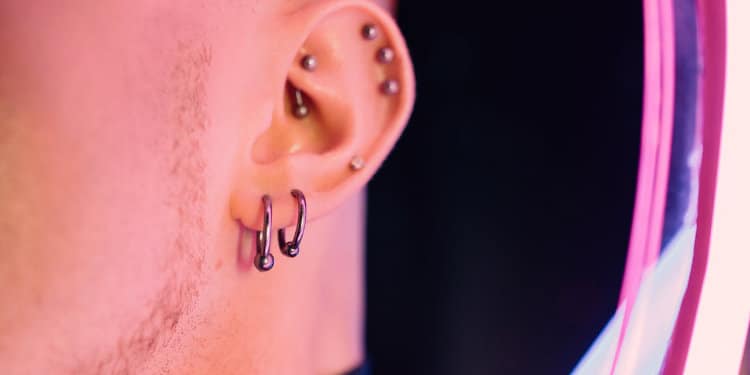










You’re a generally healthy man. But then one day, all of a sudden, you feel as if your skin is on fire. You’re sweating as if it’s 100 degrees, and you can feel your skin reddening. Your first thought might be that you’re experiencing hot flashes, commonly associated with women going through menopause. But is it possible for men to have hot flashes? Being that hot flashes resemble some of the symptoms of panic attacks, some men may assume they are caused by anxiety. Are they right?

A hot flash is a sudden, intense feeling of heat, not caused by any external environmental changes. Hot flashes are a direct result of internal processes that trigger a reaction in the body.
Symptoms of a hot flash can include:
Women most often experience hot flashes as a result of the significant hormonal fluctuations related to the menopausal process.[1] Men, on the other hand, don’t experience hormonal fluctuations in the same way women do.
During midlife, men experience what’s known as “androgen decline in the aging male” or ADAM. It’s a gradual reduction of hormones, but it does not result in the types of hormone-related symptoms (like hot flashes) seen in women. Testosterone, the primary male sex hormone, only drops about 1-2% per year after age 30 in healthy men. That slow decline is considered normal and generally not the source of their hot flashes.[2]
What does happen during male midlife is a cluster of changes that, when considered as a whole, seem to predispose menopausal-like symptoms. When men experience hot flashes, it is likely due to very specific circumstances or lifestyle issues.
It is around this time that men tend to experience what is commonly referred to as a “midlife crisis.” Essentially, they recognize that they’ve reached midlife and have begun to intensely evaluate their lives on a personal and professional level. Midlife is a time of dealing with things like relationship issues, career changes or retirement, caring for aging parents, and other stressors. Altogether, these physical and psychological factors can create feelings of anxiety, depression, and stress.
It is well known that anxiety, and stress in particular, have been linked to several physical symptoms that strongly resemble hot flashes:
It is very possible that men who feel the “hot flash” may be experiencing physical symptoms of anxiety or high stress associated with this time of life. There is a specific condition known as midlife anxiety. This type of anxiety is not due to hormonal fluctuations but rather a result of dealing with the issues that surface during midlife.[3]
Other possible factors that have been linked to these menopausal-like symptoms in men include:
So, while a lot is happening in a man’s life in midlife, significant hormonal fluctuations do not appear to be one of them. Rather, it appears that how male midlife is managed has a significant impact on how it is experienced.[4]
The short answer is quite a lot. Many of the factors associated with male midlife and those thought to contribute to the experience of hot flashes are manageable.
Focus on the “Big 3”—diet, exercise, and sleep. These factors are key to maintaining good health. Each of them is also positively correlated with stress/anxiety reduction and improved mood.
Make time to take care of yourself and relax and recharge. Allocate time for friends and family. If you’re struggling with a problem, talk it out with a trusted friend. If you find that your problems are overwhelming or keeping you from enjoying life in the way you want to, reach out for professional help.
Sometimes, talking to someone who can be objective helps you see things in a whole new way. A therapist can teach you skills to cope with your anxiety and depression. Reducing your levels of anxiety and depression may help alleviate your experience of hot flashes. If you prefer to avoid the expense and time commitment often involved in working with a therapist, you may be an excellent candidate for online therapy, which is more affordable, discrete, and efficient.
If you find that your symptoms are increasingly bothersome, even with your lifestyle changes, reach out to your healthcare provider or doctor. Even though you may not be dealing with hormonal issues, your symptoms are real. There are effective treatments for reducing your symptoms as well as for treating the anxiety and depression that may underlie those symptoms.
There are some other bodily changes men tend to face during midlife that could potentially be associated with hot flashes, though far less common. These are:
ADT is a common treatment for men with prostate cancer. Among its most common side effects are hot flashes. Approximately 80% of men who undergo ADT report experiencing hot flashes.[5]
In the absence of ADT therapy, the cause of hot flashes can be related to lifestyle factors, if not from anxiety or stress, rather than hormones.
Men tend to experience several other changes during midlife:
These changes are not necessarily linked to hot flashes but can be the root cause of some midlife anxiety and are always worth mentioning to your doctor.
One of the hardest things to do is ask for help, but you’re not alone. While you’re unlikely to get a diagnosis of “male menopause,” you will find that your doctor understands what you mean and will be able to offer you options to reduce those bothersome symptoms. You don’t have to sweat it alone.
References